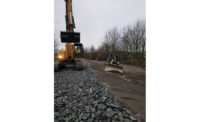Security risks and geopolitical issues are expected to prevent non-Israeli companies from participating in an Israeli Defense Ministry project to build a 60-kilometer barrier designed to prevent and monitor Hamas tunneling, according to knowledgeable Israeli sources. The above- and underground fortification will span the country’s border with the Palestinian-controlled Gaza Strip.
At least two foreign contractors invited to visit the proposed barrier site secretly have decided against involvement in the project, where workers typically don ceramic protective vests and helmets, say the sources, who declined to be identified. Israel’s online Ynetnews also speculates that at least one non-Israeli firm declined to participate for political reasons. Ynetnews adds that 20 Israeli contractors received project-scope details to bid, and four were chosen to start work in October. The defense ministry would neither provide project details nor confirm media reports.
During the 2014 Gaza war, the Israeli military found and destroyed 32 tunnels. Palestinian-Sunni fundamentalist group Hamas continues to build tunnels in the area, media reports say, and they are seen as a threat by Israelis living near the border. The Israeli military has uncovered several tunnels that have penetrated the border with Hamas-controlled areas.
According to Israeli television, the military has spent more than $250 million to combat the tunnel threat. The investment includes highly sensitive sensors to detect and locate tunnel-digging operations. But a decidedly lower-tech solution based on diaphragm walls is likely to be a major part of the proposed barrier project, estimated to cost $568 million. Israel’s largest newspaper, Yediot Ahronot, reported in late July that the ministry issued a tender to build the first 10-km segment. It said that Solel Boneh Infrastructure, a unit of top Israeli contractor Shikun & Binui Group, is now conducting a pilot along several hundred meters of the border area.
The sources say the barrier will consist of diaphragm walls down to 80 m. Crews will use hydromill trench-cutting equipment below the groundwater table. The sources add that the four Israeli firms have fewer than a dozen hydromills that are operational, and all are committed to ongoing projects.





Post a comment to this article
Report Abusive Comment